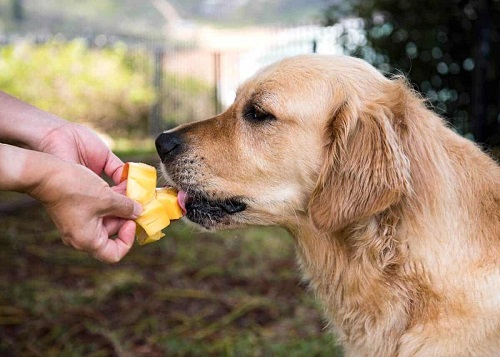Can Dogs Eat Mango? Can this delicious fruit be given as a treat to your dog? Is it safe for your dog to consume it regularly? Let’s find It!
Can Dogs Eat Mango? Well, you need to know about a few things before you proceed to give your pooch this delicious fruit. Let’s have a look at it in detail!
What is a Mango?
Mango is a tropical fruit that is native to South Asia but is now widely grown in many parts of the world.
The juicy, sweet flesh of the mango is golden-yellow in color and has a unique tropical flavor that is both tangy and sweet. Mangoes are often eaten fresh, but they can also be used in a variety of dishes, including smoothies, salads, and desserts.
Can Dogs Eat Mango?

Yes, dogs can eat mango in moderation, which can be a healthy and tasty treat. Mangoes are a good source of vitamins and minerals, fiber, and antioxidants, which can provide health benefits for dogs.
Is Mango Good for Dogs?
Mangoes are a good source of vitamins A and C, as well as fiber and antioxidants, which can provide several health benefits for dogs. As with any new food, it’s always a good idea to consult with your veterinarian before introducing mango to your dog’s diet.
Health Benefits Of Mango
Mangoes offer several health benefits, as they are a rich source of vitamins, minerals, and antioxidants. Here are some of the health benefits of mango:
- Rich in Antioxidants: Mangoes are high in antioxidants, including compounds like mangiferin, catechins, and quercetin. These compounds can help protect cells against damage from free radicals and reduce the risk of chronic diseases like cancer and heart disease.
- Boosts Immune System: Mangoes are a good source of vitamin C, which plays a key role in immune system function. Eating mangoes can help support a healthy immune system and reduce the risk of infections.
- Supports Eye Health: Mangoes are rich in vitamin A, which is essential for maintaining healthy vision. Vitamin A helps protect the eyes from damage and can reduce the risk of age-related macular degeneration, a common eye disease.
- Aids Digestion: Mangoes are a good source of fiber, which can help promote healthy digestion and reduce the risk of digestive problems like constipation.
- May Reduce Inflammation: Mangoes contain compounds like quercetin, which have anti-inflammatory properties. Eating mangoes may help reduce inflammation in the body and decrease the risk of chronic diseases like arthritis.
- Promotes Heart Health: Mangoes are a good source of fiber and potassium, both of which are important for heart health. Eating mangoes can help lower cholesterol levels, reduce the risk of heart disease, and promote healthy blood pressure levels.
Can Dogs Eat Mango? A Few Health Concerns
While mangoes are generally considered safe and healthy for most people and dogs, there are a few health concerns to be aware of:
- Allergies: Mango allergies are not common, but they can occur in some people and dogs. Symptoms of a mango allergy may include itching, swelling, hives, or difficulty breathing. If your dog experiences any of these symptoms after eating mango, stop feeding them mango and consult your veterinarian.
- Digestive Issues: Eating too much mango can cause digestive issues in dogs, particularly diarrhea or an upset stomach. To avoid digestive problems, it is important to feed mango to dogs in moderation and remove the skin and pit before feeding them.
- High Sugar Content: Mangoes are high in natural sugars, which can lead to weight gain and other health problems if eaten in excess. It is important to limit the number of mangoes you feed to your dog and incorporate it into a balanced diet.
- Choking Hazard: The skin and pit of the mango can be a choking hazard for dogs, so it is important to remove them before feeding mango to your furry friend.
How to Serve Mango to Dogs?

Before serving mango to your dog, it is important to remove the skin and pit as they can pose a choking hazard and cause digestive issues. Here are a few ways to serve mango to your dog:
- Fresh Mango: Cut the mango into small pieces and remove the skin and pit. You can serve the mango pieces as a healthy treat or mix them with your dog’s regular food.
- Frozen Mango: Freeze small pieces of mango and use them as a refreshing and healthy treat for your dog, particularly during hot weather.
- Mango Puree: Puree small pieces of mango in a blender or food processor and serve it to your dog as a special treat or as a topper for their regular food.
- Homemade Mango Dog Treats: You can make your own homemade dog treats using mango as one of the ingredients. There are several dog-friendly recipes available online that incorporate mangoes, such as homemade dog biscuits or frozen dog treats.
Can Dogs Eat Dried Mango?
Dried mango is not toxic to dogs, but it should be fed to them in moderation as it is higher in sugar and calories than fresh mango. Dried fruits, including dried mango, have a higher concentration of natural sugars because the moisture content has been removed.
Can Dogs Eat Mango Seeds?
It is not recommended to feed mango seeds or pits to dogs as they can pose a choking hazard and cause digestive issues. Mango seeds are large and hard, making them difficult for dogs to chew and swallow. If a dog swallows a mango seed or pit, it can become stuck in its digestive tract, leading to blockages or other serious health problems.
How Many Mangoes Can a Dog Eat?

The amount of mango a dog can eat depends on their size, age, and overall health.
A good rule of thumb is to feed your dog no more than 10% of their daily calorie intake in treats and to make sure that the treats you give them are balanced with their regular meals. For example, a medium-sized dog may be able to eat a few small pieces of mango per day, but a larger dog may be able to eat slightly more.
Which Other Fruits Are Good for Dogs?
Many fruits are safe and healthy for dogs in moderation. Here are a few examples of fruits that are good for dogs:
When feeding your dog fruits, it is important to remove any pits, seeds, or tough skins that can pose a choking hazard or cause digestive issues. As with mango, it is best to introduce new fruits to your dog’s diet slowly and in moderation. Additionally, it’s important to monitor your dog’s weight and overall health and consult with your veterinarian if you have any concerns about their nutrition or dietary needs.
Can Dogs Eat Mango Skin?
It is not recommended to feed dogs mango skin. The skin of the mango is tough, fibrous, and difficult to digest, and it can cause digestive issues or pose a choking hazard.
Additionally, mango skin may contain small amounts of urushiol, a toxic compound found in poison ivy and poison oak, which can cause allergic reactions in some dogs.
Can Dogs Eat Mango? Quick Takeaways
Well, Mangoes can be a healthy and tasty treat for dogs in moderation, as it is rich in vitamins and antioxidants. However, it is important to remove the skin and pit before feeding mango to your dog, as they can be difficult to digest and may pose a choking hazard.
